Zero G Read online
Copyright © Fearful Symmetry 2019. All Rights Reserved.
Cover image © Fiona Hsieh 2018
This book is dedicated to the real life Zero: my son Noah
CONTENTS
Abassi Station
The Boarding Agent
The Pathfinder
Jim and Sancho
The Stasis Pods
Waking Up
Empty
Alone
The Asteroid
Double Bacon Cheeseburgers
The Kuiper Cliff
Cargo
Action Figures
Pirates
Plan A
Tacita
The Ghost
Cat and Mouse
Hiding
Plan B
Tomato Sauce
Plan C
Caught
Paper, Rock, and Scissors
Life Support
The Alien
Payback
The Last Minute
Bedtime
Tomorrow
Acknowledgments
About the Author
Chapter One
ABASSI STATION
IT’S HARD TO CHOOSE a favorite thing about outer space, but if Zero Huang had to pick just one, it would be gravity. Or more specifically, the complete lack of gravity. Planets were pretty cool, but in space he could fly.
Which was why, waiting in the giant line to board the Pathfinder, he was sitting on the ceiling.
“You’re supposed to hold the railing,” said his mother. She, of course, was holding the railing tightly. Zero’s mom always followed the rules. In fact, looking up and down the long, straight hallway on Abassi Station, almost all of the passengers were holding on to the railing, grasping it tightly to keep from floating away. The only ones who weren’t were kids like Zero, though at twelve years old, he was probably the oldest of the goof-offs. All of them were wearing the one-piece coverall that marked them as Pathfinder passengers.
“Just hold the stupid railing, Zero,” said Yen. He was Zero’s middle brother, almost fifteen years old, and always acted like he was in charge.
“Don’t call him Zero,” said their father, his nose deep in a book—not a tablet book like a normal person reads, but a real, old, dead-tree book like they used to read in the olden days. He wasn’t holding the railing either—instead he had his foot hooked under a bar that ran along the floor. That’s how the real space travelers did it, he’d told them. Keep your foot under the bar and you can stay in one place and use both your hands, just like on Earth. Zero’s father was kind of an expert in that stuff—after all, he was one of the engineers who’d built the Pathfinder. Yaozu Huang had spent most of the last five years on Abassi Station, overseeing the construction. Zero still thought he was probably wrong about the floor bars, though, because why would a real space traveler want to stick to the floor like that? You could literally fly up here. Railings were for losers.
Zero’s parents hated it when his brothers called him Zero, but Zero didn’t mind it. Anything was better than his real name, Su-Shu, because then his brothers would call him—
“You mean Two-Shoe,” said Park.
Yep, that’s what they’d call him. It wasn’t even an insult. Zero didn’t know why they called him that, but he still hated it, which, he supposed, was probably why they called him that.
“Come on down, Two-Shoe,” said Yen with a laugh.
“Put those Two-Shoes on the floor!” Park laughed with him.
“My name is Zero!”
Park was Zero’s oldest brother, already sixteen, which was apparently old enough that he considered his brothers to be completely beneath his notice. Most of the time, at least. If he was teasing Zero now, that probably meant he was bored.
Better bored than cranky, Zero decided. Park had a girlfriend, but her family wasn’t part of the Pathfinder mission. He could text her for a few more hours—Abassi Station had great reception—but then they’d board the ship, settle in, take off, and Park would never see her again.
They’d never see anyone again, really, unless that person were on the Pathfinder, too. Or maybe the Torchbearer. After more than a century of searching, the human race had finally found two habitable planets, called Genji and Kaguya, orbiting a star called Murasaki, and they’d built two colony ships to go out and settle them. The Torchbearer mission had left last month, and last week it had cleared the solar system and Boosted the Medina StarDrive, accelerating to almost one-fifth of light speed. In about a month, Pathfinder would clear the solar system and do the same. But even at that speed, the journey would take a very long time. Murasaki was more than twenty light-years away.
The Pathfinder, and everyone on it, would be traveling for 105 years.
Everyone in line moved about four paces forward and then stopped. Another family had boarded. Zero pushed off from the ceiling, floated forward to catch up with his family, and then reached out a hand to push off of Yen’s head, settling himself back up against the ceiling. Yen slapped at him with his free hand, but it was too late, and Zero laughed, just out of reach. Yen sneered, let go of the railing, and kicked off from the floor to attack him. He got high enough to poke Zero in the ear before their mother caught him by the leg and pulled him back down.
“Hold on to the railing,” she said.
Yen looked offended. “Zero’s not!”
“He’s not starting fights, either,” said their mother.
“He pushed my head!” shouted Yen.
“Stop shouting,” said their father, calmly turning a page in his book.
Yen scowled, but hooked his foot under the floor bar and crossed his arms in a huff. Zero rubbed his ear where Yen had poked him, and tried to decide the best way to get revenge. He thought for a minute, and got an idea so horrible it made him smile.
He started quietly spitting, forming a blob of saliva in the air in front of him; it floated in the hallway like a water balloon without the balloon—a full sphere of solid spit. It took him a few minutes to get it nice and big, and the line advanced a few more times; he tapped the bubble, trying to make it move, but all that did was break off a few smaller droplets. Zero caught them before they floated onto any of the other people in line, and guided them back to the larger bubble. He played with it for a bit and found that if he pushed on the air with his palms, the little air currents would move the water.
He gathered all the spit back into one big spitball, pushed it toward his family, and gave it a double-handed air shove straight at Yen’s head. That didn’t work nearly as well as he’d hoped: instead of flying toward Yen the spitball simply rippled and stayed in place, and then Zero’s hands slammed into it, and the ball splashed into dozens of tiny spit drops that flew in every direction at once.
Zero shouted a warning, but only some of the people got out of the way: spit flew into his mother’s hair, and into the hair and clothes and faces of the people standing near them in line. One drop even hit a page of his dad’s book. It seemed like everyone got spit on them except Yen, but that didn’t stop Yen from kicking off of the floor again and flying up to tackle Zero against the ceiling. Their spit-covered neighbors gasped and shrieked, and their mom snapped at them, and their dad roared at them to come down. Park yanked them both down, and their parents said “Stop it this instant!” in one of those really angry whispers parents use when they’re in public. They put Yen at the back of the family, and Zero at the front, and Zero hooked his foot under the lower railing and waited.
An hour later, they reached the front of the line.
Chapter Two
THE BOARDING AGENT
WHEN THEY FINALLY reached the front, they saw that the line was splitting into five different minilines, each one leading to a small desk and a door. Zero’s heart sped up, and he got exc
ited—this was it! Those doors led into the Pathfinder starship! He was in the front of his family, so he walked right past the desk and tried to go through the doorway. The woman at the desk stopped him with a cheerful smile.
“Whoa, there! Not quite ready for that yet.” She looked at Zero’s mom. “Last name?”
“Huang,” said his mom, and spelled it for her: “H-U-A-N-G.”
“Excellent,” said the woman at the desk, and typed the name into the computer. “Are you . . . Yaozu and Yubi?”
“That’s us,” said his father.
She looked at the three boys. “And you three must be Park, Wenyan, and Su-Shu.”
Yen raised his finger. “That’s spelled T-W-O-S-H-O-E—”
“Stop it,” said their mother, but she smiled as she said it, trying to look like a normal, happy family. She handed the boarding agent a stack of slim plastic cards. “That’s us, all right. Here are our IDs.”
“Thank you.” The woman at the desk scanned each card across her screen, one at a time. “Oh! Mr. Huang, it says here you were one of our engineers for the Pathfinder! Thank you so much for your work! It’s a beautiful ship.”
“Thank you,” said Zero’s father.
“Your stasis pods are in Section C, Ring 181,” said the woman. “That’s right next to one of the main exits, so you’ll be some of the very first people to get off the ship when you arrive at Kaguya Colony tomorrow!”
“Golden,” said Park.
“Wait,” said Zero. “Tomorrow?”
The woman laughed—not mocking, but like Zero had just made a delightful joke. “Not tomorrow for Earth, of course, but for all of us on the ship.”
“Duh,” said Yen, smacking Zero in the shoulder. “We’re going to be in stasis pods, remember? We’re going to be asleep the whole time.”
“I know that,” said Zero, “but—”
“Did you really think we were going to spend a hundred years awake?” asked Yen. “Just sitting on the ship, picking our noses for a hundred—”
“Quiet,” said their mother sharply, and then smiled at the desk agent. “They’re very excited.”
“I know about the stasis pods,” said Zero, frowning. “I know it’ll seem like tomorrow, but it’s actually a hundred and five years.”
“That’s right!” said the woman brightly. “I can see someone’s read the intro packet.” She winked at Zero, then handed the ID cards back to Zero’s mom. “Thanks to engineers like your dad here, the Pathfinder is equipped with the Medina StarDrive, which will take us to the edge of the solar system in about a month. At top speed, we’ll be going nearly four million kilometers per hour!”
“So you’re going to be on the ship with us?” asked Park. He was using his “impress a girl” voice. Zero made a gagging face.
“I will!” said the woman. “I’m part of the Kaguya Colony administrative staff, so I’ll also be one of the people processing you when it’s time to leave the ship tomorrow.” She smiled at Zero. “In a hundred and five years.”
“Wait,” said Yen. “The Medina drive is way faster than four million kilometers an hour. Isn’t it supposed to be, like, one-fifth of light speed?”
The woman looked at their mom with a kind of gobsmacked admiration; Zero was really starting to think that this boundless cheerfulness was all just an act. “You have a family of little geniuses, don’t you?” She winked at their father. “I suppose that shouldn’t surprise me with an engineer like you.” She looked back at Yen. “You’re absolutely right: the Medina StarDrive is very fast, but once we clear the edge of the solar system, the computers will Boost it, and it will go so much faster. The Pathfinder will accelerate to one-fifth of light speed, which is almost twenty-two trillion kilometers per hour—that’s about five point five thousand times faster than our top speed inside the solar system.”
“Why can’t we just hit the Boost right here?” asked Zero. He’d read most of the intro packet, but it had gotten really boring after the first page.
“Because one-fifth of light speed is fast enough to be incredibly dangerous if anything gets in our way,” said the woman. “Deep space is almost completely empty—we can go as fast as we want without running into anything bigger than dust, and our hull shields will be more than enough to handle those kinds of impacts. But inside the solar system we have planets, we have moons, we have asteroids—”
“There’s an asteroid belt,” said Park, obviously trying to impress her.
“There are two asteroid belts,” said Zero. He felt a gleeful victory when the woman smiled at him instead of at Park.
“That’s right!” she said. She tapped on the screen, and a new set of plastic cards began printing through a slot in her desk. She grabbed each one as it finished, collecting them into a pile so they couldn’t float away. “There’s a small belt between Mars and Jupiter, and a much bigger belt beyond Neptune. That big one’s called the Kuiper Belt, and it’s where dwarf planets like Pluto and Eris are. It’s still pretty empty compared to the smaller belt, but it’s full enough that we don’t risk Boosting until we get to the other side of it. Then it’s clear sailing from here to Murasaki!”
“Remember when we rode on that motorboat in the lake last summer?” asked their father. “When you’re still in the harbor you have to go super slow—they call it ‘wakeless speed.’ This is the same kind of thing, only . . . bigger.”
“Much bigger,” said their mother.
“Golden,” said Zero.
“These cards are the keys to your stasis pods,” said the woman, handing the five new keys to Zero’s mom. “They’ll also be your new IDs on Kaguya Colony, so don’t lose them. Now just go through this door, across the boarding bridge, and follow the signs to Section C, Ring 181. You can open your pods with those keys, get in, and then you’ll wake up twenty light-years away!”
“Thank you so much,” said their mother. “All right, boys, let’s go.”
They walked through the door and around a corner.
And then Zero saw the Pathfinder starship for the very first time.
Chapter Three
THE PATHFINDER
THE PATHFINDER WAS ENORMOUS. Zero had already known that it was the biggest spaceship ever built—even bigger than the Torchbearer—but seeing it in person was incredible. He stopped in the hallway and stared out the window at it: a gigantic cylinder, almost a full kilometer long and more than a hundred meters wide. It was even bigger than the space station.
“It looks like a skyscraper, lying on its side,” said Zero.
“It basically is,” said his father, standing next to him at the window. “It would be the biggest skyscraper on Earth, too, if it was down on Earth.”
Zero stared at it. “You built the whole thing in space, right?”
“We did,” said his father. “That made it a lot easier, for a lot of reasons, but mostly because it meant we got to ignore gravity. It never tipped over, we never dropped anything, and when it was done we didn’t have to launch it into space. All the room at the back, where we would have had to put a giant rocket booster, is just full of supplies instead.”
“Zero gravity is the best,” said Zero, and let go of the railing to float even higher.
“Don’t get too excited,” said his mother, grabbing him by the arm and pulling him back to the floor. “Let’s go find our pods.” She walked toward the boarding bridge, and the family followed.
“Yeah, calm down,” said Yen, and flicked him in the ear as he walked past. Zero frowned and rubbed his ear, but didn’t retaliate.
The boarding bridge was wider than the hallway on the station had been, and almost completely transparent, like a giant glass tube. It stretched out from Abassi Station to a door in the Pathfinder’s side, and it was full of people gawking—at the ship, at the station, at space, at everything. Zero stared wide-eyed at the empty blackness around him—it was practically like floating outside in space!—and paid so little attention to where he was going that he bumped right into Park.
“Watch it, Zero.” Park pushed him away, and Zero didn’t have anything to grab onto, so he had to float all the way to the far wall before pushing off of it and propelling himself back toward his family. Coming back meant he was facing a different direction, which gave him a whole new distraction to look at, and he bumped into his mom this time.
“Sorry,” he said quickly, and pointed out the side of the tube. “Look!”
His mother gripped Zero’s arm, so he wouldn’t float away again, and together they looked at the giant glowing blue marble of Earth.
“It’s next to us,” he said, staring in wonder. “I thought Earth was below us?”
“You’re in zero gravity,” said his mother. “Up and down can be whatever you want them to be.”
“Cool,” said Zero, and turned himself so that the Earth was under his feet. It made it look like everyone else was standing on the side of the tube instead of the bottom. “You guys look weird.”
“Not as weird as you,” said Park.
“Be nice,” said his father. “Do you want to see inside?”
They hurried through the boarding bridge toward the ship, pulling themselves along with railings, floor bars, and a series of handholds placed all over the sides of the tube. When they reached the ship they floated inside, part of a crowd of other passengers, and Zero stared in wonder. The tube carried them toward the center of the giant ship, passing a bunch of smaller aisles as they went. Each aisle was short and narrow—a perfect size for Zero, but his father and maybe even Park would have had to crouch to walk through them. The center of the ship, on the other hand, was wide-open, laced with metal struts but otherwise empty.
“This is the main route through the ship,” said Zero’s father. “See that?” He pointed to a group of signs, painted directly onto the metal. The first said, “Ring 90.” The second showed an arrow pointing to the left and said, “Rings 1–89.” The last sign pointed off to the right and said, “Rings 91–300.”

 Partials
Partials The Devil's Only Friend
The Devil's Only Friend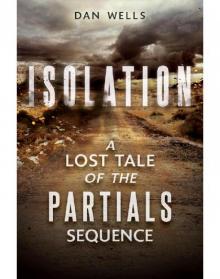 Isolation
Isolation I Don't Want to Kill You
I Don't Want to Kill You Ones and Zeroes
Ones and Zeroes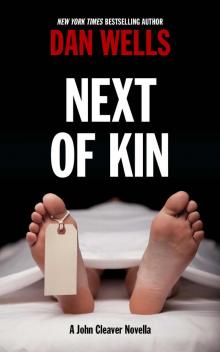 Next of Kin
Next of Kin Over Your Dead Body
Over Your Dead Body Fragments
Fragments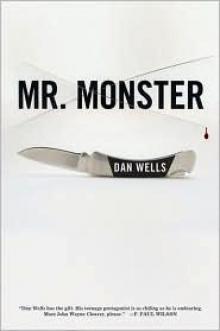 Mr. Monster
Mr. Monster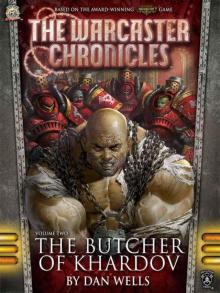 The Butcher of Khardov
The Butcher of Khardov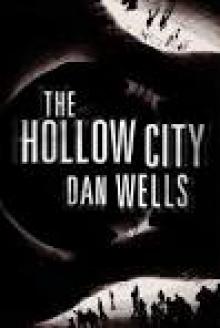 I AM NO T A S E RI AL KI L L E R
I AM NO T A S E RI AL KI L L E R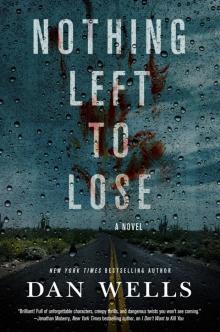 Nothing Left to Lose--A Novel
Nothing Left to Lose--A Novel Active Memory
Active Memory A Pear-Shaped Funeral
A Pear-Shaped Funeral I Am Not a Serial Killer
I Am Not a Serial Killer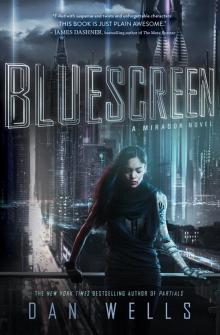 Bluescreen
Bluescreen Ruins
Ruins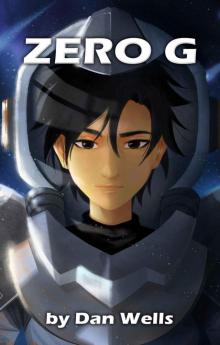 Zero G
Zero G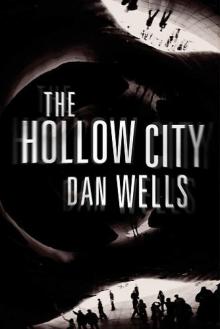 The Hollow City
The Hollow City Extreme Makeover
Extreme Makeover Partials p-1
Partials p-1 The Complete John Wayne Cleaver Series: I Am Not a Serial Killer, Mr. Monster, I Don't Want to Kill You, Devil's Only Friend, Over Your Dead Body, Nothing Left to Lose
The Complete John Wayne Cleaver Series: I Am Not a Serial Killer, Mr. Monster, I Don't Want to Kill You, Devil's Only Friend, Over Your Dead Body, Nothing Left to Lose